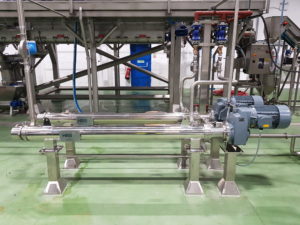UK carrot grower adds powder processing line to cut down on waste
When a longtime root crop operation in the UK wanted to diversify its offerings, carrot powder was a way it went.
Family-owned for four generations, Huntapac is a leading UK grower and supplier of root crops, such as carrots and parsnips. Following a reorganization in 2019, the company wanted to develop new value-led product options, so it installed a state-of-the-art line to produce carrot powder, which included a heat exchanger from HRS Heat Exchangers.
Established near Preston in 1942, Huntapac initially grew a range of crops for fruit and vegetable markets before starting to supply supermarkets in the 1970s. The company was a major producer of root crops, salads and brassicas — such as cauliflower and broccoli — until a few years ago, when it decided to rationalize its operations and concentrate solely on the root crops.
The business grows more than 1,300 hectares of carrots and parsnips across the UK, from Suffolk to Scotland, all of which are taken to the company’s factory at Holmes near Preston for washing and packing. With the increased focus on root crops, the company was keen to add value to the 5% of the crop which is not suitable for its packing customers and looked at a number of options before deciding on the production of carrot powder, which can used as an ingredient in pet food and animal feed.
“Five percent may not sound like a lot, but when you are washing up to 450 tons of carrots a day, it soon adds up,” said Steven Kay, the commercial director for Huntapac. “We researched a few methods because there are lots of different drying techniques available, and we felt that the process that was right for use was to puree the carrots, put them over a drying drum and then mill the flake that results into a powder.”
In early 2020, plans began for the powder production line. As the first of its kind in the UK, much consultation between all the parties was involved, including equipment suppliers, such as HRS Heat Exchangers. The process begins when the carrots are diced and then pureed, after which they are fed into the heat exchanger. This consists of two HRS R Series rotary scraped surface heat exchangers placed in series, which raises the temperature of the carrot puree from 50°F to 140°F (or 10°C to 60°C).

As well as the heat exchangers themselves, HRS supplied two feed hoppers and an HRS BP Series positive displacement pump to feed the puree into the heat exchanger. The heat for the process is supplied from a dedicated steam boiler and the line has a capacity of 1,100 pounds (500 kilograms) of puree per hour. The warmed puree is then passed over a drying drum where it is dried to create a flaked product which is milled down into the finished powder.
“Pre-heating the puree before the drier performs two main functions,” said HRS UK sales manager Andy Ensor. “Warming the puree makes it easier to move through the line as it has less resistance, but the biggest benefit is that it reduces the amount of energy needed to dry the puree making the overall process more efficient.”
Production of carrot powder began in the first half of 2021 and the line now produces around 60 kilograms of dried finished product an hour. The carrot powder is produced under Feed Materials Assurance Scheme (FEMAS) accreditation and is used as an ingredient in animal feed.







